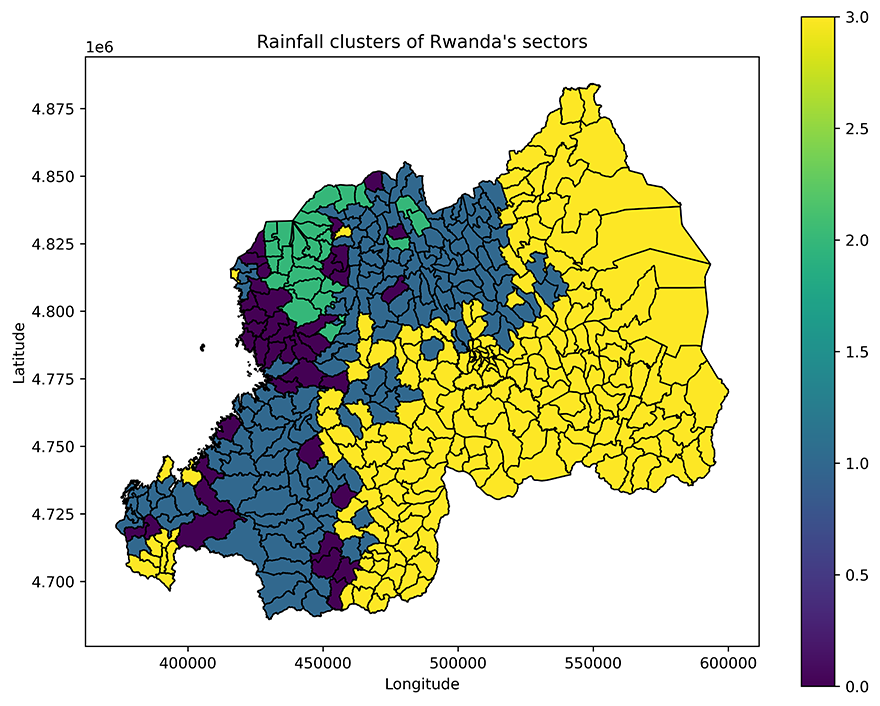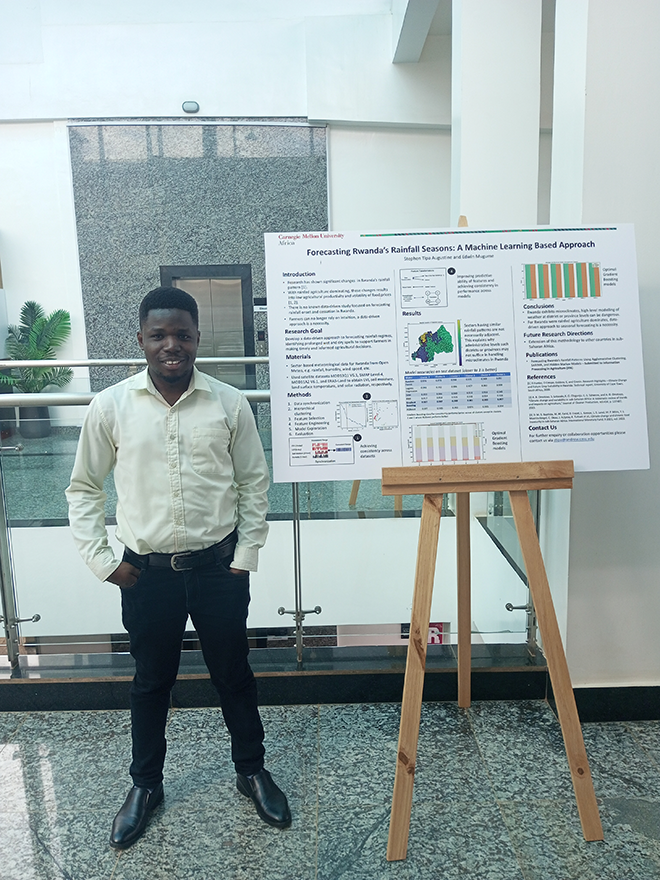Student research forecasts changing rainfall in Rwanda
CMU-Africa student Stephen Augustine is researching rainfall forecasting methodology that addresses food insecurity in Rwanda caused by shifting climates.
As weather conditions become more unpredictable, agriculture yields grow increasingly uncertain. In Rwanda, rising temperatures and fluctuating rainfall patterns are shifting traditional growing seasons by one to two months and reducing rainfall predictability, making it harder for Rwandan farmers to reliably plan optimal sowing times. These changes will compound food insecurity in Africa, where 20 percent of the Sub-Saharan population faced undernutrition in 2021.
CMU-Africa student Stephen Augustine is addressing this problem by researching a hybrid rainfall forecasting methodology that combines data-driven predictive SARIMA and Hidden Markov models (HMMs) with agglomerative clustering.

Source: College of Engineering
By grouping together sectors with similar rainfall, researchers can account for microclimatic variation within Rwanda without having to create hundreds of individual forecasting models.
SARIMA models are statistical analysis tools that use time series data to forecast future trends, especially those with seasonal patterns like rainfall. The SARIMA models in this research can predict rainfall up to four weeks ahead.
Because rain seasons can experience dry periods (and vice-versa), this research uses HMMs, which are probability indicators, to recognize wet and dry spells within seasons.
“In the rainy season, you may encounter a week where there is no rain. This doesn’t mean you’re in the dry season. This is where the Hidden Markov models come in,” explained Augustine. “They learn from past rainfall data to determine if a region is in a dry or wet spell, or if the season has changed altogether.”
Agglomerative clustering sorts Rwanda’s 416 sectors into four groups based on similar rainfall patterns. This simplifies the modeling process, only requiring four SARIMA and Hidden Markov models instead of 416, while still accounting for microclimates within Rwanda. This approach is unique compared to other research that categorizes countries as single units. The SARIMA and Hidden Markov models used in this research achieve between 73 and 88 percent prediction accuracy for the four Rwandan clusters.
Augustine has carried out very transformative research that can have a profound impact on the agriculture sector in Rwanda.
Edwin Mugume, Assistant Teaching Professor, CMU-Africa
“Most weather forecasting papers don’t consider that different parts of the same country can have different weather patterns,” said Augustine.
“Augustine has carried out very transformative research that can have a profound impact on the agriculture sector in Rwanda,” said Edwin Mugume, an assistant teaching professor who contributed to this research. “With unpredictable rainfall and shifting seasons, Rwanda and other countries in the region need to embrace technology to strengthen climate resilience and enhance food security. We aim to engage the Rwandan authorities to support the adoption of tools developed through this research to benefit Rwandan farmers.”

Source: College of Engineering
Stephen Augustine
Augustine graduated in 2025 from the research track of the MSIT program, which is designed for students interested in pursuing a research career or a Ph.D. This 144-unit track includes 60 units of core courses, 48 units of elective courses (up to 12 of which can be undergraduate credit), 36 units of an engineering research project, seminars, and a three-month master’s internship.
“The course assignments are hands-on and well-structured with clear expectations,” said Augustine. “The things I’ve learned in this research have really minted my knowledge of machine learning and data science. You plan an entire process of how to solve a problem while achieving certain metrics so that other people can utilize your work.”
Augustine said publishing research through the MSIT program will strengthen his Ph.D. application.
“Doing research prepares you for the future if you want to get a Ph.D. or go into a research career,” said Augustine.
Mugume and Tim Brown, a professor of electrical and computer engineering, engineering and public policy, and director of the Kigali Collaborative Research Center, contributed to this research and advised Augustine.
The things I’ve learned in this research have really minted my knowledge of machine learning and data science.
Stephen Augustine, MSIT Student, CMU-Africa
“It’s important to choose the right advisor when doing research. You need to work with someone who is supportive and easy to meet with,” said Augustine. “Professor Mugume and Professor Brown have been really helpful. I meet with Professor Mugume every week to discuss progress and plan how to move forward. That’s been helpful because this is my first publication.”
“Working with Augustine has been very rewarding; he is highly motivated and demonstrated his advanced data science and machine learning skills as well as aptitude for research,” said Mugume. “He is well-prepared to pursue doctoral research after successfully completing our rigorous MSIT program and demonstrating his research talent.”
Augustine plans to continue this research by integrating machine learning algorithms and other meteorological variables like temperature, humidity, and wind patterns. Future studies could also evaluate the impact of deforestation and changes in land use and expand the current framework to include real-time sensor data. These additions could refine the forecasting model and provide a more comprehensive understanding of climate dynamics that could facilitate more adaptive climate resilience strategies.
